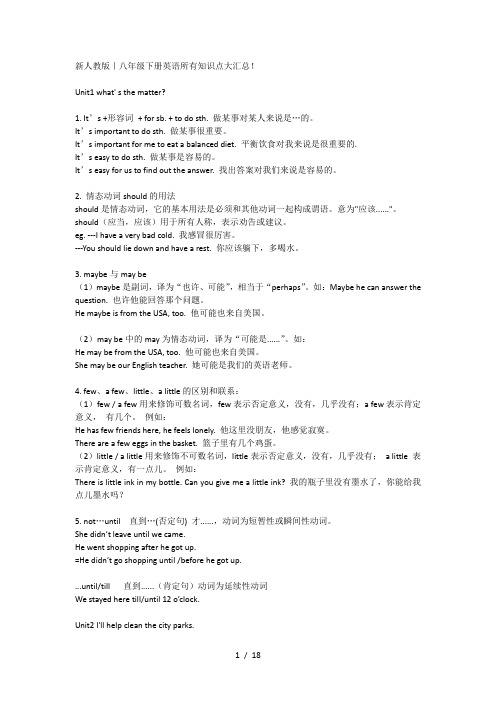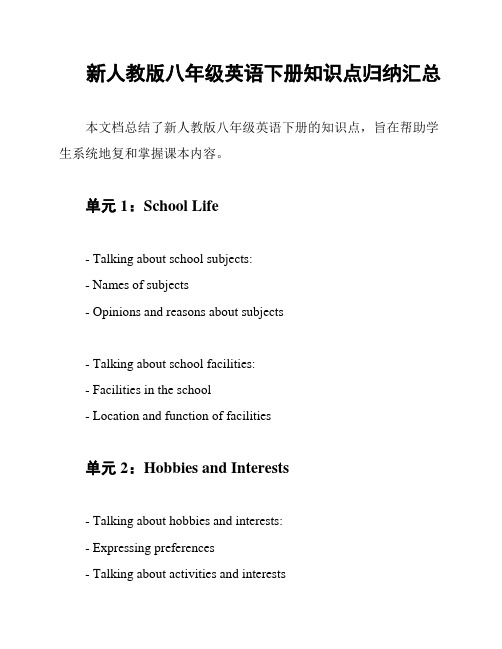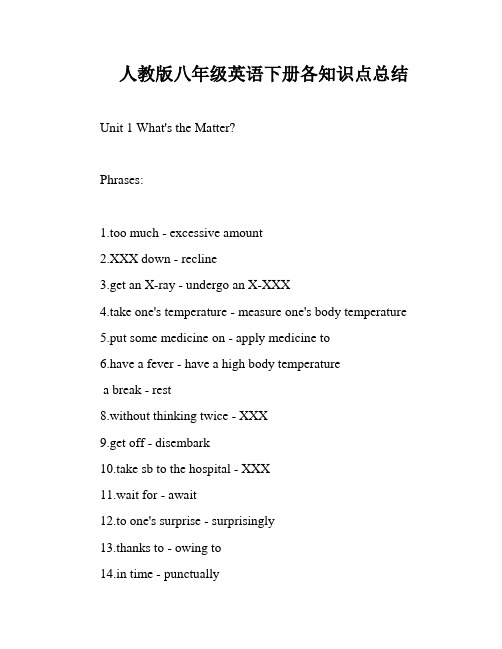2012年秋新人教版八年级英语下册各知识点归纳总结
新人教版|八年级下册英语所有知识点大汇总

新人教版|八年级下册英语所有知识点大汇总!Unit1 what' s the matter?1. It’s +形容词+ for sb. + to do sth. 做某事对某人来说是…的。
It’s important to do sth. 做某事很重要。
It’s important for me to eat a balanced diet. 平衡饮食对我来说是很重要的.It’s easy to do sth. 做某事是容易的。
It’s easy for us to find out the answer. 找出答案对我们来说是容易的。
2. 情态动词should的用法should是情态动词,它的基本用法是必须和其他动词一起构成谓语。
意为"应该......"。
should(应当,应该)用于所有人称,表示劝告或建议。
eg. ---I have a very bad cold. 我感冒很厉害。
---You should lie down and have a rest. 你应该躺下,多喝水。
3. maybe与may be(1)maybe是副词,译为“也许、可能”,相当于“perhaps”。
如:Maybe he can answer the question. 也许他能回答那个问题。
He maybe is from the USA, too. 他可能也来自美国。
(2)may be中的may为情态动词,译为“可能是......”。
如:He may be from the USA, too. 他可能也来自美国。
She may be our English teacher. 她可能是我们的英语老师。
4. few、a few、little、a little的区别和联系:(1)few / a few用来修饰可数名词,few表示否定意义,没有,几乎没有;a few表示肯定意义,有几个。
例如:He has few friends here, he feels lonely. 他这里没朋友,他感觉寂寞。
人教版八年级下册英语知识点总结

人教版八年级下册英语知识点总结人教版八年级下册英语知识点总结八年级英语第一单元知识点归纳1.bescaredofsb./sth.恐惧某人/某物2.goup上升,与rise同义,与godown或set相反3.makeanoise发出声响,吵闹4.arrivein到达,表示到达某一城市、国家等大地方时,用介词in;表示到达某一村庄、车站等小地方时,用介词at;到达的地方用副词表示时,可不用介词。
5.notuntil直到才6.seedoing停止做某事7.gocycling相当于gotorideabike,意思是去骑车。
8.nitsb.onthehead表示“打某人的头”,表示的“打某人的脸”要用hitsb.intheface。
9.turnaround转身10.falloff摔下来11.givesb.apush推某人一下12.helpsb.dosth.=helpsb.withsth.帮助某人做某事13.getoff从下来,通常指下火车、巴士、轮船、飞机等。
14.thinkabout思考、想起、想到(某人或某事)15.allday一整天16.onebyone一个接一个地,类似有yearbyyear一年又一年;daybyday一天又一天。
17.holdon有两个意思,一个是“(电话)不挂断”;一个是“抓紧”。
edown下来八年级英语第二单元知识点归纳1.growinto长成2.passsb.sh.=passsth.tosb.递给某人某物3.billionsof数十亿的,hundred,thousand,million,billion等词前面有具体数字时,其本身用单数形式,直接修饰名词;表示一个笼统的概念时,这些词用复数形式,而且常与介词of连用修饰名词。
4.lookafter=takecareof照顾,照料。
5.befullof满,充满=befilledwith6.bemadeof/from由制成,bemadeof表示在制成的过程中,原材料没有发生质的变化;bemadefrom表示在制成的过程中,原材料发生质的变化。
新人教版八年级英语下册知识点归纳汇总

新人教版八年级英语下册知识点归纳汇总本文档总结了新人教版八年级英语下册的知识点,旨在帮助学生系统地复和掌握课本内容。
单元1:School Life- Talking about school subjects:- Names of subjects- Opinions and reasons about subjects- Talking about school facilities:- Facilities in the school- Location and function of facilities单元2:Hobbies and Interests- Talking about hobbies and interests:- Expressing preferences- Talking about activities and interests- Talking about free time:- Discussing how free time is spent- Making plans for free time单元3:Finding A Job- Talking about future jobs:- Discussing future careers- Describing job responsibilities- Talking about skills and qualities:- Describing skills and qualities for different jobs - Discussing personal skills and qualities单元4:Healthy Living- Talking about health and lifestyle:- Discussing healthy habits- Talking about exercise and diet- Talking about illnesses and symptoms: - Giving advice for staying healthy单元5:Going Shopping- Talking about shopping:- Discussing preferences for shopping - Describing shopping experiences- Talking about money:- Discussing prices and quantities单元6:Visiting Places- Talking about places:- Describing famous places- Talking about tourist attractions- Talking about travel plans:- Making travel arrangements- Talking about past travel experiences单元7:Festivals and Celebrations- Talking about festivals and celebrations:- Describing traditional festivals- Talking about cultural celebrations- Talking about activities and traditions:- Describing activities during festivals- Explaining traditions and customs单元8:Environment- Talking about environmental issues:- Discussing environmental problems- Giving suggestions for protecting the environment - Talking about actions and measures:- Describing actions to save the environment- Discussing personal contributions to the environment以上是新人教版八年级英语下册的知识点归纳汇总。
人教版八年级英语下册各知识点总结

人教版八年级英语下册各知识点总结Unit 1 What's the Matter?Phrases:1.too much - excessive amount2.XXX down - recline3.get an X-ray - undergo an X-XXX4.take one's temperature - measure one's body temperature5.put some medicine on - apply medicine to6.have a fever - have a high body temperaturea break - rest8.without thinking twice - XXX9.get off - disembark10.take sb to the hospital - XXX11.wait for - await12.to one's surprise - surprisingly13.thanks to - owing to14.in time - punctually15.think about - consider16.have a heart problem - suffer from heart disease17.get into trouble - encounter difficulties18.do the right thing - act correctly19.fall down - stumble20.put。
on sth - place something on something else21.get hit/sunburned - get injured/sunburned22.be interested in - have an interest in23XXX24.take risks/take a risk - take a chance25.lose one's life - die26.because of - due to27.run out of - exhaust28.cut off - sever29.get out of - exit from30.make a n/ns - make a choice31.be in control of - manage32.give up - abandonUsage:1.need to do sth - require to do something2.see sb doing sth - observe someone doing something3.ask sb sth - XXX4.expect sb to do sth - anticipate XXX do something5.agree to do sth - consent to do something6.help sb (to) do sth - assist XXX do something7.want to do sth - desire to do something8.tell sb to do sth - instruct XXX do something1.What’s wrong with you。
新版人教版八年级下英语语法重点归纳(全)

新版人教版八年级下英语语法重点归纳(全)一、名词名词是指用来表示人、事物、地方、动物等的名称的词语。
名词分为可数名词和不可数名词。
可数名词有单数和复数两种形式,而不可数名词只有单数形式。
- 可数名词:表示单数时,名词前面通常有冠词a/an或者其它数量词进行修饰;表示复数时,名词通常要在词尾加“s”。
- 不可数名词:不可数名词表示的是无法分为个体的物体、概念、抽象事物等,通常不能用于复数形式。
二、动词动词表示人或物的动作、行为、状态或存在的词语。
动词分为及物动词和不及物动词。
- 及物动词:及物动词后面可以直接接宾语,表示动作的承受者或影响对象。
- 不及物动词:不及物动词不能直接接宾语,它可以后面接副词或介词短语,表示动作发生的方式、状态等。
三、形容词形容词是用来描述名词性词语的词语。
它可以表示人或物的性质、状态、特征、颜色等。
- 形容词可以修饰名词,放在名词的前面。
- 形容词还可以通过加后缀“-er”和“-est”来比较级和最高级。
四、副词副词是用来修饰动词、形容词和其他副词的词语。
副词可以表示时间、地点、方式、程度、频率等。
- 副词在句中通常位于动词、形容词或者其他副词的前面。
- 副词的比较级和最高级可以通过在前面加上more和most来表示。
五、代词代词是用来代替名词或名词性的词语的词语。
代词可以分为人称代词、指示代词、疑问代词、不定代词等。
- 人称代词表示人的身份或人称,包括主格和宾格两种形式。
- 指示代词用来指示特定的人或物,可以表示近处的、远处的或已提到的事物。
- 疑问代词用于提问,通常用来询问人或事物的身份、性质、数量等信息。
- 不定代词用来指代不特定或泛指的人或物,表示数量或程度。
六、冠词冠词是位于名词前面用来修饰名词的词语。
冠词分为定冠词和不定冠词。
- 定冠词指特指某一具体的人或事物,有两种形式:定冠词“The”用于表示特定的人或物,而不定冠词“A/An”用于泛指任意的人或物。
七、介词介词是用来表示人或物之间关系的词语。
最全面人教版八年级下册英语各单元知识点总复习归纳总结

最全面人教版八年级下册英语各单元知识点总复习归纳总结Unit 1 How often do you exercise?词汇1. frequently 经常地2. hardly 几乎不3. ever 曾经4. once in a while 时不时5. rarely 很少语法一般现在时1. 频率副词放在动词前:I always read newspapers.2. 否定句用don't或doesn't+动词原形:I don't watch TV every day.3. 疑问句用do或does+主语+动词原形:Do you play soccer every week?Unit 2 I used to be afraid of the dark.词汇1. used to 过去常常2. get over 克服3. nervous 紧张的4. confident 有信心的5. stage 舞台语法1. Be used to+动名词表示惯或适应,I am used to studying English at night.2. Used to+动词原形表示过去常常,I used to read books every day.3. Get over+名词/代词/动名词,表示克服,She got over the flu last week.Unit 3 Could you please tell me where the restaurants are?词汇1. instruction 说明2. turn right/left 向右/左转3. excuse me 对不起4. straight 直走5. opposite 对面语法1. Could you please/could/may I+动词原形,请求礼貌地做事,Could you please help me with my English?2. Would like+名词 / 动名词,表示想要做某事,I would like to go shopping with you.3. May I ask+句子,礼貌地询问某事,May I ask where the restroom is?Unit 4 Why don't you talk to your parents?词汇1. conversation 对话2. listener 听众3. honest 诚实的4. conversation starter 聊天开场白5. effective 有效的语法1. How about/What about+动名词/名词,表示建议和提议,What about watching a movie?2. Why not+动词原形,表示建议和提议,Why not go swimming?3. Let's+动词原形,表示建议和提议,Let's have a party on the weekend.Unit 5 It must belong to Carla.词汇1. sweater 毛衣2. by accident 偶然地3. honest 诚实的4. lose 丢失5. owner 拥有者语法1. Can/Can't+动词原形,表示能力或可能性,I can dance.2. Must/Mustn't+动词原形,表示肯定或否定的推断,She must be the new teacher.3. Have/Has to+动词原形,表示必须做的事情,I have to finish my homework first.词汇1. graduate 毕业生2. physics 物理学3. ambitious 有抱负的4. career 职业5. education 教育语法一般将来时1. be going to+动词原形,表示打算做某事,I am going to see a film tonight.3. be + going to+现在进行时,表示不久会发生的事情,They are going to sing a song later.Unit 7 How do you make a banana milk shake?词汇1. recipe 食谱2. whip 打(奶油)3. peel 去皮4. slice 切片5. pour 倒语法1. What/How/Which+系动词+主语+谓语,表示特定的主语或具体的内容。
人教版八年级英语下册各单元知识点总结完整版

Unit 1 What’s the matter?一、重点短语1. have a fever 发烧2. have a cough 咳嗽3. have a toothache 牙疼4. talk too much 说得太多5. drink enough water 喝足够的水6. have a cold 受凉;感冒7. have a stomachache 胃疼8. have a sore back 背疼9. have a sore throat 喉咙痛10. lie down and rest躺下来休息11. hot tea with honey加蜂蜜的热茶12. see a dentist看牙医13. get an X-ray拍X光片14. take one’ s temperature量体温15. put some medicine on sth在……上面敷药16. feel very hot 感到很热17. sound like 听起来像18. all weekend 整个周末19. in the same way以同样的方式20. go to a doctor 看医生21. go along 沿着……走22. on the side of the road 在马路边23. shout for help 大声呼救24. without thinking twice 没有多想25. get off 下车26. have a heart problem 有心脏病27. to one’ s surprise 使……惊讶的28. thanks to 多亏了;由于29. in time及时30. save a life 挽救生命31. get into trouble 造成麻烦32. right away 立刻;马上33. because of 由于34. get out of 离开35. hurt oneself 受伤36. put a bandage on sth. 用绷带包扎37. fall down 摔倒38. feel sick 感到恶心39. have a nosebleed 流鼻血40. cut his knee割伤他的膝盖41. put her head back 把她的头向后仰42.have problems breathing呼吸困难43. mountain climbing登山运动44. be used to doing sth. 习惯做某事45. run out (of) 用完;用尽46. so that 以便47. so…that 如此……以至于……48. be in control of 掌管;管理49. in a difficult situation 在逆境屮50. keep on doing sth.坚持做某事51. make a decision做出决定52. take risks 冒险53. give up 放弃二、知识点解析1. What’s the matter? 怎么了?若是询问“某人怎么了?”要用“What’s the matter with sb.?”拓展:What’s the matter with sb.? 的同义句:What’s wrong with sb.? / What’s the trouble with sb.?2.疾病类短语:have a +疾病. e.g. :have a fever 发烧have a cold 感冒have a cough 咳嗽.have a +身体部位-ache. e.g.: have a headache 头痛have a toothache 牙痛.have a sore+身体部位. e.g.: have a sore throat咽喉痛have a sore back背痛例题:Mom, I____________.I’m sorry to hear that, dear. We must go to see the dentist right away.A. have a headacheB. have a stomachacheC. have a toothacheD. have a fever3. lie down 躺下V. 躺,平躺。
人教版英语八年级下册知识点总结

人教版英语八年级下册知识点总结一、语法知识点1. 时态:掌握一般现在时、一般过去时、一般将来时、现在进行时、过去进行时、过去将来时等时态的用法。
2. 过去进行时:用于表示过去某一时间正在进行的动作或状态。
3. 以下代词和副词的用法:- somebody, anybody, nobody, everybody 可用作主语或宾语。
- something, anything, nothing, everything 可用作主语或宾语。
- somewhere, anywhere, nowhere, everywhere 可用作地点副词。
4. 句型:掌握各种基本句型,如祈使句、选择疑问句、反义疑问句等。
5. 状语从句:掌握时间、原因、结果、条件等类型的状语从句的用法,并注意从句的引导词。
6. 定语从句:研究使用关系代词 who, whom, whose, which, that 引导定语从句,并了解先行词和关系词在从句中的作用关系。
二、词汇知识点1. 词汇拼写和用法:巩固和扩大基础词汇量,掌握词汇的正确拼写和用法。
2. 同义词和反义词:研究常用的同义词和反义词,提高词汇表达的能力。
3. 词组和固定搭配:掌握常用的词组和固定搭配,能够灵活运用。
三、阅读知识点1. 阅读理解:提高阅读理解能力,掌握快速获取信息的技巧。
2. 阅读策略:研究使用各种阅读策略,如扫读、略读、详读、推断等。
3. 阅读技巧:培养良好的阅读惯和技巧,如划重点、标记陌生单词等。
四、写作知识点1. 写作结构和组织:研究写作时合理安排文章结构和组织思路,使内容连贯。
2. 信息衔接和过渡:掌握信息衔接和过渡的方法,使文章各部分之间有逻辑性。
3. 词汇和句型运用:运用丰富的词汇和多样的句型,提高写作表达的准确性和流畅性。
以上为人教版英语八年级下册的主要知识点总结,希望能帮到你!。
- 1、下载文档前请自行甄别文档内容的完整性,平台不提供额外的编辑、内容补充、找答案等附加服务。
- 2、"仅部分预览"的文档,不可在线预览部分如存在完整性等问题,可反馈申请退款(可完整预览的文档不适用该条件!)。
- 3、如文档侵犯您的权益,请联系客服反馈,我们会尽快为您处理(人工客服工作时间:9:00-18:30)。
新人教版八年级英语下册各知识点归纳总结Unti1 what’s the matter?短语归纳1.too much 太多2.lie down 躺下3.get an X-ray 做个X光检查4.take one ’s temperature 量体温5.put some medicine on ......在....上敷药6.have a fever 发烧7.take breaks /take a break 休息8.without thinking twice 没多想9.get off 下车10.take sb to the hospital 送某人去医院11.wait for等待12.to one’s surprise 使.......惊讶的thanks to多亏于;由于14.in time及时15.think about 考虑16.have a heart problem患有心脏病17.get into the trouble 遇到麻烦18.do the right thing做正确的事情事情19.fall down 摔倒20.put ...... on sth把...放在某物上21.get hit/sunburned 摔伤/烧伤22.be interested in 对.....感兴趣23.be used to 习惯于.... 24.take risks/take a risk 挑战25.lose one’s life 失去生命26.because of 因为27.run out of 用完28.cut off 切除29.get out of 从...出来30.make a decision/decisions 做决定31.be in control of 掌管;管理32.give up 放弃用法归纳1.need to do sth .需要去做某事2.see sb doing sth 看见某人正在做某事3.ask sb sth 询问某人某事4.expect sb to do sth 期望某人做某事5.agree to do sth 想要做某事6.help sb (to) do sth 帮助某人做某事7.want to do sth 想要做某事8.tell sb to do sth 告诉某人做某事9.have problems(in) doing sth 做某事有困难e sth to do sth用某物去做某事11.be/get used to doing sth 习惯于做某事12.seem to do sth 好像做某事13.keep on doing sth 继续做某事14.mind doing sth 介意做某事语法点1.询问某人的健康问题及遇到麻烦的表达方法2.情态动词should的用法情态动词should的用法表示劝告与建议,也表义务与责任第一人称问句中,征询建议要记清3.不定代词的用法相关阅读方法推理判断阅读法精细解读1. What’s the matter (with you)? 怎么了?出什么事了?What’s the trouble/ the problem / wrong with sb./ sth.?2. I had a cold.我感冒了。
have a cold=catch a cold=have the flu have a fever have a cough咳嗽have a stomachache胃疼,肚子疼have a toothache牙疼have a headache头疼3. 身体部位+ache(疼痛)构成新的复合词stomach+ache=stomachache head+ache=headache tooth+ache=toothacheback+ache=backache后背痛4. much too+ 词,意为,too much+ 词,意为。
5. enough【形容、副词】足够的/地,enough放在名前后,形副后。
good enough足够好,enough money=money money6. lie down躺下,lie 躺,躺着,过去式lay;lie说谎,过去式lied7. maybe “或许”,常用于句首,表示可能性,后加句子。
Maybe you are right.may be,是情态动词+be的结构,意为“可能,也许”,后加名词、代词或形容词。
He may be angry.8. sound like+名词代词和从句:It sounds like you don’t k now the truth. It sounds like a good idea.sound+形容词,“听起来,好像”,The music sounds nice.9. need 需要,实义动词need+名词,需要某物;need to do sth.需要做某事,主语通常是人,表示人主动的动作:You need to listen carefully during class.need doing sth.主语通常是物,表示被动的动作:Your dirty clothes need washing.10. get off (the bus) 下(公交车)get on 上车11. agree 同意,赞同;同意做某事,同意某人的看法、观点。
12. trouble问题,麻烦;be in trouble ,maketrouble ,have trouble (in) doing sth. =have difficulties (in) doingsth 。
13. right away=right now=at once,意为。
14.【复习】advice [不可数名词]劝告,建议,向…征求意见,give sb. advice on sth.就某事给某人建议;advise [动词] advise sb. to do sth.advise sb. doing sth .15. 【复习】exercise 动词意为,可数时意为,不可数时意为。
16. hurt 及物动词,使……疼痛,……受伤,He hurt his leg while exercising.不及物动词,……(部位)疼。
His leg hurt badly.17. clean 【动词】,clean the classroom ,【形容词】,cleaner意为。
18. hit (用手或器具)打;击打The boy hit the dog with a stone.hit sb. on the head/ nose/ back打某人的头、鼻子、后背,on用在所打较硬的部位;hit sb. in the face/ eye/ stomach 打某人的脸、眼睛、肚子,in用在所打较软的部位。
19. be used to sth./ doing sth.习惯于、适应了……、做某事,强调状态;His grandpa was used to country life.Mary is not used to getting up early in the morning.get/ become used to sth./ doing sth. “变得习惯,逐渐适应……”强调过程、动作:It’s difficult for one to get used to another country’s habit.20. 【复习】free [形容词]空闲的free time;免费的the drink is for free;自由的I want to become a free bird.free【动词】使……解脱,得到自由He could not free his arm.21. run out用完,用尽When his water run out, he knew that he would have to do something to save his own life.物sth. tun out. 某物用尽了。
人sb. run out of物sth..人用尽了某物。
He run out of all his money last night.22. risk (sb.) to do sth. 冒险去做某事take a risk=take risks 冒险23. the importance of (doing) sth.(做)某事的重要性We students should know the importance of (learning) English.importance n. 重要(性),important adj.重要的,unimportant adj.24. decision 【名词】决定;抉择;make a decision make a decision to dosth.= 。
25. be in the control of …掌管,管理The headmaster is in the control of this new school.be out of control无法控制,无法管理be under control被控制住,在控制之中26. 【复习】mind意为,mind doing sth. , Would you mind my opening the window?27. give up (doing) sth. 放弃(做)某事,give up (playing) computer games;give up后可接名词、代词和动词ing形式,也可不接,如Never give up easily.二、重要短语1. have a cold2. have a stomachache3. see sb. do sth.4. shout for help5. expect (sb.) to do sth.6. to one’s surprise7. thanks to …8. think about…9. be interested in sth.10. lose one’s life11. save one’s life12. take a risk=take risks13. cut off14. keep on doing sth三、重点语法【反身代词】英语中共有八个反身代词,在使用时应注意和它所指的相应的对象在人称、性【用法】1. 可用作宾语,指的是宾语和主语表示同一个或同一些的人或事物。
如:Maria bought herself a scarf. We must look after ourselves very well.2. 可用作表语,指的是表语和主语表示同一个或同一些人或事物。
